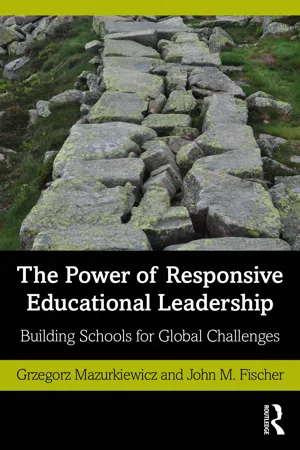
The Power of Responsive Educational Leadership
Building Schools for Global Challenges
- 200 pages
- English
- ePUB (mobile friendly)
- Available on iOS & Android
The Power of Responsive Educational Leadership
Building Schools for Global Challenges
About This Book
The Power of Responsive Educational Leadership examines how educational leaders might respond to global challenges such as the environment, technology, inequity, the health crisis, and the stability of democracy. It draws on models of educational leadership and development projects from around the world to explore how leaders might use the curriculum and teaching to help move their communities, regions, and countries in positive directions.
The authors argue that educational leadership needs to move away from authoritarian or transactional bureaucracy and toward leadership in a participatory mode that feels responsible for the children and adults in their institution and responsible for the society they all inhabit. The Power of Responsive Educational Leadership:
-
- Offers a comprehensive exploration of the multifaceted nature of leadership for learning
-
- Charts the key thinking and practices that engage with the principles of leadership for learning and the implications these have
-
- Provides a variety of fresh perspectives on the connections between education, schooling, and leadership
-
- Includes a range of internationally diverse case studies and vignettes
This comprehensive guide invites readers to engage in thinking about new directions for education today. The book will be a useful starting point for individuals who choose to engage in discussions and deliberations around what it means to be responsive. It will be invaluable for those who are working as principals and teachers or participating in education leadership development programs around the world and hope to work in various roles.
Frequently asked questions
Information
1
Introduction
Conceptualizing foundations of responsive educational leadership
Education for learning
Our goal
Table of contents
- Cover
- Half Title
- Endorsement Page
- Title Page
- Copyright Page
- Dedication
- Table of Contents
- List of Figures
- Foreword: Leadership Properly Understood
- Chapter 1: Introduction: Conceptualizing foundations of responsive educational leadership
- Chapter 2: Challenges abound
- Chapter 3: The local/global pendulum: Context, place, and educational leadership
- Chapter 4: Building a strategic framework for responsive educational leadership
- Chapter 5: Actions focused on learning and development
- Chapter 6: Using responsive leadership to re-form school
- Chapter 7: A bird’s eye view: Everything is connected
- References
- Index